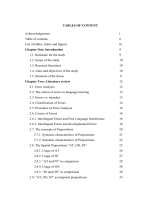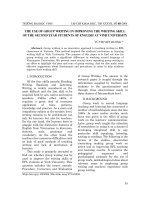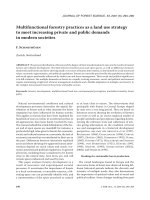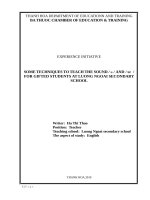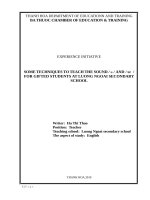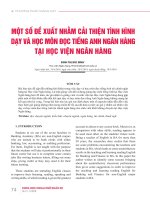The effective strategy to learn the listening and notetaking skill of sophomores and juniors of english major at huflit graduation paper, major business english
Bạn đang xem bản rút gọn của tài liệu. Xem và tải ngay bản đầy đủ của tài liệu tại đây (576.04 KB, 44 trang )
MINISTRY OF EDUCATION AND TRAINING
HO CHI MINH CITY UNIVERSITY OF FOREIGN LANGUAGES
AND INFORMATION TECHNOLOGY
DEPARTMENT OF FOREIGN LANGUAGES
GRADUATION PAPER
THE EFFECTIVE STRATEGY TO LEARN THE LISTENING
AND NOTETAKING SKILL OF SOPHOMORES AND
JUNIORS OF ENGLISH MAJOR AT HUFLIT
Instructor:
Ms. Ngo Thanh Phuong (M.A)
Student:
Ha Hoang Anh
Student ID:
15DH710089
Major:
Business English
Ho Chi Minh City, June 18th, 2019
DECLERATION
I certify my authorship of the study report title “The effective strategies to
learn Listening and notetaking skill of sophomores and juniors of English
major at HUFLIT”
This graduation paper is my original work. No other person’s work or ideas
have been used without acknowledgement. Except where I have clearly stated that I
have used some of this material elsewhere, I have not presented this for assessment
in another course or unit at this or any other situation.
Name/signature:
June 18th, 2019
i
ACKNOWLEDGEMENTS
During the process of carrying out the graduation paper, I have received
many great supportance and encouragements from teachers, family, and friends.
This graduation paper could not have been completed without the help and support
from a number of people who all deserve my sincerest gratitude and appreciation.
First of all, I would like to express my sincere appreciation to the staff of
Department of Foreign Language, because they gave me an opportunity to do this
graduation paper.
Next, I am extremely appreciative of my supervisor - Ms. Ngô Thanh
Phượng, who has always been willing to give me precious advices and suggestions,
comments, correction and inspirable guidance in order that I complete successfully
this study.
Furthermore, I wish to express my deepest gratitude to my parents, brothers
and sisters who have provided me with great spiritual support during the time I
conducted this research.
I am very grateful to Ms. Lê Thị Thanh Hà, a teacher of Up English Center,
joined in the interview related to my topic. Besides, I am so thankful to juniors and
sophomores of Department of Foreign Languages who took part in survey in order
to support my research.
I am equally indebted to my classmates for their suggestions and encourages
in the process of my study.
I hardly forget to convey my thanks to good friends who help me much in
completing this study for precious materials and advises.
ii
TABLE OF CONTENTS
Content
Page
DECLERATION
i
ACKNOWLEDGEMENTS
ii
TABLE OF CONTENTS
iii-iv
ABSTRACT
v
LIST OF ABBREVIATIONS
vi
CHAPTER 1: INTRODUCTION
1-3
CHAPTER 2: LITERATURE
4-10
2.1 Problems of learning Listening and Notetaking skill
4-7
2.2 Sollutions to improve Listening and Notetaking skill
8-10
CHAPTER 3: METHODOLOGY
11-12
3.1 Setting
11
3.2 Participants
11
3.3 Data Collection
12
3.4 Data Statistic
12
CHAPTER 4: RESULTS AND DISCUSSION
13-24
4.1 Survey questionnaire
13-23
4.2 The interview
24
iii
CHAPTER 5: CONCLUSION
25-31
5.1 Summary of the study
25
5.2 Limitation of the study
25-26
5.3 Suggestion for further studies
26
5.4 Recommendation to improve Listening and Notetaking skill
26-31
REFERENCES
32-33
APPENDIX A
34-36
APPENDIX B
37
iv
ABSTRACT
Listening and Notetaking skill is one of the most important factor affects to
one’s learning, working and daily life. However, notetaking skill is new type of
listening process which makes students have some troubles. The purpose of this
graduation paper is to investigate the difficulties of students of Department of
Foreign Languages (DFL) at HUFLIT when learning Listening and Notetaking
skill. Then, it would like to find out the reasons why for those problems and the
solutions for students to overcome. The research was conducted by a group survey
of 50 juniors and 50 sophomore chosen randomly from Department of Foreign
Languages, and interview of an English teacher to gather information and data. So,
the collecting data instruments like questionnaire, interview were used to do the
study. The results of the research will point out the difficulties and solutions
sophomores and juniors face when they learn Listening and Notetaking skill.
Besides, the most effective strategy to learn this skill was provided for sophomores
and juniors to improve this skill.
Keywords: Department of Foreign Language (DFL), HUFLIT, sophomores,
juniors, Listening and Notetaking skill, difficulty, solution, improve, strategy
v
LIST OF ABBREVIATIONS
HUFLIT: Ho Chi Minh City University of Foreign Languages and Information
Technology
DFL: Department of Foreign Languages
vi
CHAPTER 1: INTRODUCTION
Recent developments in society have heightened the need for using English.
It is considered the key to one’s success, and the main tool for communicating as
well as working in big and small domestic and foreign companies. According to
Pourhosein Gilakjani and Seyedeh Masoumeh Ahmadi (2011), out the four main
areas of communication called Listening, Speaking, Reading, and Writing,
Listening is considered as one extremely significant skill in studying, working, and
real life.
In school context, noting (Note-taking) is one of the most important skills to
help people improve their ability to memorize information during lectures, tests,
discussions and especially in international certification exams such as IELTS,
TOEIC. Notetaking skill is not involved recording all the ideas but the ideas must
be recorded selectively, and presented in a clear and logical way. The notes are the
pictures which reflect the focus, the understanding, as well as the care of listeners
and note takers. Human’s memory is limited, and remembering a large amount of
information such as figures, data, names of persons or places, or time is not easy.
Based on these problems or difficulties, recording the keywords or main ideas is
extremely important, and the worthiest way for students to remember what they
have learned in classes is recording everything they have heard. This information is
combined with new information, organized in a way that makes sense, and then
stored until it is needed (Eggen & Kauchak, 2013). Nevertheless, this skill seems to
be challenging for many students due to the need of combining numerous sub skills.
Moreover, many surrounding factors plus the constant pressure listeners often face
make it tremendously difficult to learn this skill. Azmi Bingol, Celik, Yidliz, and
Tugrul Mart (2014) stated that there are a lot of difficulties that learners may
encounter in the listening and notetaking processes and the purpose of this thesis is
to be aware of these problems and try to solve them.
1
If people would like to do any jobs such as translator, interpreter, teachers,
speakers, or reporters, they must have a good listening skill. However, to support
the particular job that requires recording important information in limited time, we
need the specific skill of note taking. Ferris & Tagg, (1996, cited in Kim, 2004)
mentioned that lack of note-taking skills and problems with note-taking as well as
listening comprehension are troublesome areas most often reported by international
students. Listening and notetaking skill is used with different purposes in various
contexts. For instance, people listen to news every day, staff listens and takes note
to contribute their opinions when they are in a meeting, or students listen to their
teacher’s lectures. Rost (2001) thought that listening skill can be mostly used in
normal daily life and develops faster than the other language skills which indicates
that it makes easy the development of the other language skills.
Because of the limitations of time and knowledge, this study cannot cover all
previous researches on the issue of Listening and Notetaking skills. Therefore, this
research will focus on examining the troublesome of HUFLIT’s sophomores, and
juniors of Department of Foreign Languages (DFL) in learning that skill.
Students of English majors as sophomores and juniors have to study 2
courses of Listening and Notetaking skill, and experience different troubles of this
skill. Therefore, the purpose of this investigation is finding out and analyzing
students' difficulties in listening and notetaking skill, which make them lose the
interest in learning this subject in class. Since then, the researcher will offer the
most effective strategy of learning this skill to help students overcome this huge
challenge.
This research will be structured in five sections. The study opens with an
introduction of Listening and Notetaking skills, and its importance to students' real
life, work and learning. The next section will mention the difficulties which
students often face when learning this skill and some ways to overcome their
troubles by themselves, as well as cover the studies of previous authors related to
2
this topic. The selection of method, and the collection of information and data will
be discussed in section three. Section four will mention the results obtained after
analyzing and discussing. The final chapter will give a conclusion with the
recommendation for students the most valuable and essential process of studying
Listening and Notetaking subject.
The research questions:
What are the difficulties for sophomores and juniors in learning Listening and
Notetaking skill?
What should students do to improve their weakness?
3
CHAPTER 2: LITERATURE REVIEW
2.1 Problems of learning Listening and Notetaking skill
Students may encounter many difficulties learning a new subject. It is
certainly the case of listening and notetaking skill, which causes both sophomores
and juniors numerous problems.
Fistly, although students start to learn English from elementary school to
high school as a compulsory subject, their vocabulary and sentence structures are
still relatively weak. As they enter university, the background knowledge, shortage
of vocabulary, weak pronunciation and poor grammar make them feel afraid of
Listening and Notetaking skill. Hamouda (2013) stated that English learners have
crucial problems in listening process because schools pay attention to grammar,
reading, and vocabulary. Furthermore, although students have overgone 3 courses
of Listening 1, 2, 3 before learning Listening and notetaking skill, they still cannot
master listening skill. Listening is the ability to understand and identify what
speakers say. However, without new words and grammar, the content of the
conversations will not be truly transferred to the partners. Note taking is a difficult
skill for students because now they have to struggle not only to understand what
people are saying but also note down what they heard.
Secondly, there is an extremely popular habit in listening English and
notetaking skill as while listening, students try to translate everything they have just
been heard into Vietnamese with the purpose of understanding the lectures.
Listening and translating are complicated processes, requiring fluency in both
languages, and quickness in handling, remembering and writing down information.
According to Inga Dagilienė (2012), while translating students are focused on
identifying differences in structure and vocabulary, they have to evolve strategies to
deal with them and to negotiate the potential of both languages. Therefore, it takes a
lot of time to listen and to translate into Vietnamese, which makes most students not
4
focused on taking notes. It is difficult to listen, write and select important
information all at once (Konrad et al., 2009). Students often assume that anything
shown on the blackboard or screen is important and write everything (Baker &
Lombardi, 1985). Note-taking is a complex activity that combines comprehension
with production of notes, and this complicated process is dependent upon working
memory (Piolat et al., 2004).
Thirdly, students are not familiar with organizing ideas, so they cannot
arrange ideas or key words they heard logically and effectively. The important thing
to arrange in the notetaking process is to capture the structure of the lecture, or the
conversation. Jerry Plotnick suggested that “you must be ready to come up with
whatever essay structure helps you to convince your reader of the validity of your
position”. There are some genres of lecture with separate outlines like as
conversation between two people, an academic lecture, biography of celebrity, or
the talk about process. Not understanding the outline make students confused, not
knowing how to write down ideas properly. If they are in the test, the low results as
a result of messy notation.
Fourthly, confusing organizations affects the result of the notetaking. On
account of not arranging main information and key words according to a scientific
and logical organization which makes the notes become messy, and hard to review
when necessary. The thesis are confused with the main arguments and sub
arguments, along with using the repeating words that make the readers hard to
understand what students have taken note. For example, during the tests, writing
down what students heard without arrangement, as the result the lecture did not
understand and give them lower results. Moreover, the secretary has just heard the
director and the managers summarize, introduce the content and taken note in a
meeting. If they take note of a lot of things without rearrangement, it is difficult to
review and rewrite the report.
5
Moreover, with a huge system of abbreviations and symbols, it is not quite
difficult to take notes. There are many types of abbreviations like a long term that
can be shortened by using one or more letters or symbols for specialized terms in
chemistry, nuclear medicine, physiology, statistics, bibliography, and other
specialized disciplinesare. With a view to reducing the amount of language, students
use shortening words and sentences. It is very necessary to remember many
abbreviations and symbols stand for what students note down to review later.
Therefore, without having many vocabularies and knowing how to take
abbreviations, this skill is a huge obstacle. These reduced forms are really and truly
difficult for learners, especially sophomores.
Sixthly, the fast speed and longer lectures make them hard to catch up with
the content, and not have enough time to write down the information, keywords or
main ideas. Azmi Bingol, Celik, Yildiz, and Tugrul Mart (2014) expressed that the
level of the students can have a significant role when they listen to long parts and
keep all information in their mind. It is a great challenge if a lower level student has
to listen and notes a long talks with a lot of information. Short conversations or
discussions give students more motivation to listen and take notes. Lewis &
Reinders (2003) mentioned the cause Note taking stated by students, “because they
have to be fast while taking notes, their handwriting can be far from neat, thus, they
can’t read their own handwriting later”.
Furthermore, the key factor hindering sophomores is the lack of
concentration and motivation. Azmi Bingol, Celik, Yidliz, and Tugrul Mart also
mentioned that when listening texts contain known words it would be very easy for
students to them. When listening to long talks with difficult and confusing words, or
unfamiliar
topics, students feel depressed and do not have the motivation to
continue. Nguyen Ngoan stated in his article “listening to VOA: advantages,
problems and solutions”, the problem is believed to rise from the unfamiliar,
uninteresting and too long listening which makes the students feel strange,
6
discouraged and bored with what they are hearing. They miss important information
that makes the process of notetaking interrupted, and the next part of the speech will
not be completed. In addition, students are not highly focused due to being affected
by external factors such as speakers, noise, new interesting things, recorded material
quality, etc. As Flowerdew & Miller (1996) assumed that one problem of students
included the speed of delivery, new terminology and concept, difficulty in focusing
and the physical environment. For example, if students sit next to windows or
doors, the noise will affect their listening process. The sound of the recordings
which is too big or too small, and poor quality also affects the listening and
notetaking process of sophomores.
Finally, unfamiliar accent is tremendously important factors of talks creating
difficulties to master the details. An accent is a manner of pronunciation peculiar to
a particular individual, location, or nation. An accent may be identified with the
locality in which its speakers reside (a regional or geographical accent),
the socioeconomic status of its speakers, their ethnicity, their caste or social class (a
social accent), or influence from their first language (a foreign accent). Accents
typically differ in quality of the voice, pronunciation and distinction of vowels and
consonants, stress, and prosody. Because of many different accents in regions,
juniors who do not really exercise a lot will feel giant problems. They do not
understand those accents, they can hardly guess what the speaker said to take notes.
English structures include both vowels, consonants, accents and intonation. The
difficulty that students often encounter is not just emphasize on stress, speaking
without intonation and accents. When listening to a native speaker pronouncing
correctly, students cannot recognize it when they normally remember the word in a
completely different way. According to Goh (1999), 66% of learners mentioned a
speaker’s accent as one of the most significant factors that affect listener
comprehension. Unfamiliar accents by both native and non-native can cause serious
problems in listening comprehension and familiarity with an accent helps learners’
listening comprehension.
7
2.2 Sollutions to improve Listening and Notetaking skill
To overcome the fear of listening and notetaking skill, each student has to
make him or her be aware of their own weakness and struggle to overcome them.
They have to build up their lexical vocabulary while broadening their knowledge in
different fields especially academic issues. Oxford (1990) claims that vocabulary is
“by far the most sizeable and unmanageable component in the learning of any
language, whether a foreign or one’s mother tongue, because of tens of thousands of
different meanings”. Wilkins (1972) also states that
There is not much value in being able to produce grammatical sentences if
one has not got the vocabulary that is needed to convey what one wishes to
say ... While without grammar very little can be conveyed, without
vocabulary nothing can be conveyed.
Learning listening and notetaking skill, students need to listen more than
translate in order to prevent neglecting their listening and missing what they need.
Moreover, they should not write any words you heard, just the main ideas and
general ideas so as to record essential content for using later.
When taking notes, students should write the main topics and subtopics first,
and then write their arguments by using the line characters. The numbers, figures or
data are organized according to the content and outline from large to small details,
the most important to the less important. Use abbreviations and symbols to make
notes more logical and effective. Whether the outline is effective or not is due to
how students arrange and organize their ideas as well as the intimate relationship
between the ideas.
Because the system of abbreviations and symbols is extensive, besides
memorizing many popular abbreviation and symbols, each student should create
own rules in order to take note easily and efficiently. Many people still abbreviate
the Vietnamese words like "k" instead of "không", or "n" instead of "nhiều", "b"
8
instead of "bạn" ..., students can also create their own English simple abbreviations
like “you’re” instead of “you are”, “won’t” instead of “will not”, “smpl” instead of
“simple”, “yrs” instead of “years”, “rmv” instead of “remove”, “b4” instead of
“before”, “2” instead of “too” or “to”, “e.g” instead of “example”. These
abbreviations are set by students, so only they can read and understand it.
According to Becton Loveless (2019), using symbols, abbreviate long words and
use short phrases in notes when possible. Many students use the following symbols
and abbreviations while taking notes: & (and), w/o (without), eg (for example), ie
(that is). During listening long talks, students only need to remember and use their
own rules. It is simpler and more convenient than thinking the abbreviation of
words to take note. Most significantly, students must make enquiries about all kinds
of organization such as TV programs, meetings, discussions, lectures or
conversations, then apply appropriate outline for each category because of the
different structures of the listening section. Johnie H. Scott, Assistant Professor
suggested that “Try to write down your notes in the following outline form. Start
main points at the margin. Indent secondary ideas and supporting details. Further
indent material that is subordinate to those secondary points.”
Furthermore, selecting materials to listen is also one of the most important
factors. If students listen to relevant and interesting topics to them such as football,
music, an excellent movie, or a cooking program, they will be more interested in
academic materials. When they are attracted by these talks, they will have more
motivation to focus on listening and taking notes. As Hamid Reza Haghverdi, Reza
Biria, & Lotfollah Karimi (2010) assumed that note takers must comprehend
information and try to store information in long-term memory by writing it down;
select the information to record and format it in ways that differs from the source
material. Moreover, students have to review what lecturers have taught together
with preview the new material so as to distinguish the types of talks and prepare the
suitable outlines.
9
To get used to the different accents, students should listen to a lot, and
perceive a variety of different voices so as not to be confused when listening and
taking notes. Students have to examine how native speakers pronounce words, their
intonation patterns and the tone of voice and practice as much as possible.
10
CHAPTER 3: METHODOLOGY
3.1. Setting
To gather information about difficulties when studying Listening and
Notetaking skill as well as the effective methods to improve this skill, the way
chosen to collect data is non – experiment method and interview. The non experiment method was done by a group of 100 students of Department of Foreign
Language (DFL) at HUFLIT in April, 2019. They participate in a survey by
answering all questions of the questionnaire (Appendix A) about everything related
to Listening and Notetaking skill.
Besides, to get more usefully and efficiently information about learning this
skill, interviewing a teacher with 4 years’ experience in teaching English is also a
valuable way.
3.2 Participants
To supplement the information for the research, the interview was conducted
with Ms. Le Thi Thanh Ha on May, 2019 at UP English Center. Ms. Ha, who is a
long period of time teacher, is a cheerful and enthusiastic teacher, and has own
methods to help student feel excited and interested in Listening and Notetaking
skill.
Moreover, the survey was undertaken with the participation of 50 juniors and
50 sophomores chosen randomly from DFL at HUFLIT. Their ages from 19 to 21,
and genders are not important. They are in the second semester of their academic
year 2018-2019 at HUFLIT. Sophomores are studying Listening and Notetaking
skills 1, while juniors have just finished Listening and Notetaking skills 2. Their
majors are education, business and interpreter, and have own professional
experience on Listening and notetaking skills.
3.3 Data collection
11
An interview is carried out with Ms. Ha who agreed to help researcher
helpfully and comfortably. This aim is to collect her opinions about challenges of
Listening and Notetaking skill, how she inspires students in class, and the solutions
to solve their problems. After the interview, the researcher records the result of the
interview carefully. The interview data analysis will be presented with the collected
data from questionnaire in each part.
An electronic questionnaire was used, which was the primary source used in
this study. The questionnaire consists of ten questions divided for the two objects –
sophomores and juniors. They will answer by selecting any listed choices related to
the questions around listening and notetaking skill like as the reason why they have
to learn this subject, difficulties in learning this subject, how they overcome the
challenges and the expectations in the teaching methods. After collecting the data,
the information was recorded in the research paper to analyze.
3.4 Data statistic
Both the qualitative and quantitative data in Google forms were allowed to
use to take participants’ opinions about difficulties of learning Listening and
Notetaking skill as well as ways to overcome. They all had a week to retain the
questionnaires to the researcher.
To investigate the technology’s application, Google Form Application SPSS
and Microsoft Excel were be applied and analyzed to show the statistics of the
result.
12
CHAPTER 4: RESULTS AND DISCUSSION
4.1 Survey questionnaire
70
60
50
40
30
20
10
0
Reinforce
Useful for other
listening skill and
subjects
train memorizing
Significant for
future jobs
All of them
None of them
Figure 4.1 The reasons why students have to learn Listening and Notetaking skill at HUFLIT
The figure 4.1 illustrates some popular reasons why students have to learn
Listening and Notetaking skill at HUFLIT. According to the graph, tree-fifths of the
sophomores think that this skill is useful for other subjects, more than half consider
that the purpose is to reinforce Listening skill and train memorizing, and less than a
third believe that Listening and Notetaking skill is significant for the future jobs. A
fifth assumes all those reasons why they have to learn this skill at university, while
less than fifth is exactly opposite.
Clearly, since students of DFL are studying most subjects in English, if they
have good English listening and notetaking skill, they will study other subjects
better. They listen and write down the important information heard briefly and
13
logically to prepare for later tests. Learning the main ideas or key words is time
saving and effective for tests. During the process of learning this skill, students have
to listen to many topics containing various of vocabulary and grammar, structures
they are also familiarized with different accents of native speakers combining with
the ability of notetaking skill in the limited time. Therefore, they have more
opportunities to practice their memory, adapt to listening and remembering to take
note at the same time. For finding a good future job, it will be an advantage,
essential factor. For example, secretary has to own good listening and notetaking
skill during important meetings in the long term. In addition to quick memorizing,
computer proficiency, ability to speak, and be sensitive, notetaking is also an
important factor. Besides, interpreters are people who regularly interact with many
people in large and small meetings. Learning listening and notetaking at university
is a good foundation for them to interpret what the customers say in the
conversations. Not only to memorize and translate, their notes are also designed to
support in remembering important elements of the conversations, such as numbers,
names, and locations. Furthermore, a good speaker or reporter must also record the
main ideas after listening and collecting data in order to transfer to everyone. In a
word, regardless of your career, listening and notetaking skill is one of the
indispensable factors that decides future success.
14
None of them
20
All of them
20
Unfamiliar with organizing
ideas
26
Unable to remember ideas and
details in long talks
36
Weak at listening skills
Impossible to pick up key
information from the talk
Not mastering abbreviations
and symbols
Short of vocabulary
38
18
44
54
Figure 4.2 The difficulties sophomores often face when learning Listening and note taking skill
According to survey, it can be seen from the chart that there are 80% of the
total think that Listening and Notetaking is a significantly difficult subject, and 20%
of the rest think that listening and notetaking is not quite difficult because it is a
normal subject in education program of university. Concerning the figure 4.2, the
rate of shortage of vocabulary and weak abbreviation and symbols is double as the
one of unfamiliar with organizing ideas and impossible to pick up key information
from the talks. A small minority consider that weak at listening skill at high school
or at the first year of university, and unable to remember the details and ideas in the
long talks are also the difficulties making students not interested in this subject.
It is clear that most of sophomores unable to remember during listening and
taking note because of a wide range of vocabulary system and many easy to
15
misunderstand acronyms. Therefore, they think that knowing many vocabularies
and reading more materials about taking notes will provide a chance to get used to
and develop both listening and notetaking skills. Besides, memorizing the popular
abbreviations and symbols is an indispensable way to mastering the main
information, and make the notes more convenient. When listening to a long talk,
they only need to use abbreviations or symbols to take notes for what you had
heard. It is a pity when sophomores do not learn listening skill at high school or
even not really familiar with it in college, so they usually have afraid of trying to
listen to everything of the speakers. In the case of not hearing any words, they
always think about it and miss the part behind, making the notes a lot of problems.
To improve the notes, sophomores often design by themselves the structure of a
lecture as well as how to get the main ideas or key words. They can write down by
their own words, so long as they can understand what they had noted down when
reviewing or using later. Reviewing the old lesson and previewing the new lesson
will help reinforce what the lectures have taught in the class, the brain develops its
full capacity to remember faster and longer.
16
78
58
54
20
Help improve listening
skill
Guide the simple but
most effective way to
note quickly
Offer outlines to guide
while note taking
Others
Figure 4.3 Wishes of sophomores from lectures
According to the figure 4.3, sophomores were asked about the satisfaction
with the lecture’s way as well as expectations from lectures to develop this skill.
From the data in Figure 4.3, it is apparent that their greatest expectation for teachers
is to help them improve their basic listening skill, followed by offer outlines to
guide while note taking, and finally guide the simple but most effective way to note
quickly and others.
This means that if sophomores are regularly listened to different topics from
entertainment, to culture, politics, education, so on, they will improve the listening
17
skill, acquire different structures or organizing of talks, making it easier to take
notes. In order to become familiar with many different structures, lectures should
offer outlines to guide while taking notes. Because each type of structure has a
suitable outline, choosing the corresponding outline will not take much effort to
take note whether it is long or short. Besides, lecturers guide sophomores the simple
but most effective way to note quickly. The lecturers who have experienced
troublesome of Listening and notetaking skill understand what students are weak
and how students should do to improve that weakness. They capture the psychology
of each student so that guide to learn the most effective and reasonable learning
methods.
18
